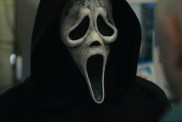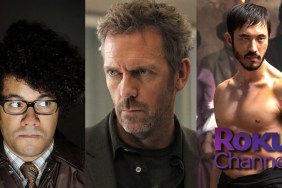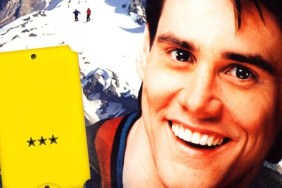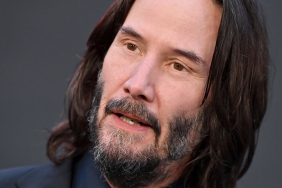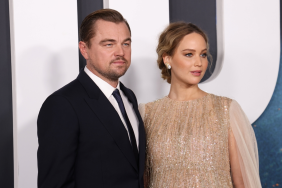Samuel L. Jackson talked to ComingSoon.net on the set of Lakeview Terrace about his latest role as a LAPD officer who has issues with an interracial couple who lives next door to him.
Q: Tell us about the movie.
Samuel L. Jackson: It’s a treatise on race I guess. One guy’s harassment of a peace loving, beautiful little couple trying to start out life.
Q: Did you have to do any research on LAPD guys?
Jackson: This is not a police procedure movie. It’s about relationships. So no, not at all.
Q: Did you create a back story for your character to try and bring it home?
Jackson: Yeah. I have to share it with you? I’m not going to do that. You do the same things every time to try and make sure that you create a reality basis for the character. Educational background, military background, what his marriage was like, what happened, how it all happened. There have been several scenarios presented in terms of what happened. There was a time when he had a wife and their relationship wasn’t so good and there was time now he doesn’t have a wife. Still interesting things about their relationship comes up. We’ve created another kind of distinction for his attitude. There were things that were written that didn’t play out very well. But for me, explaining racism is not something that you can necessarily do. Having grown up in the segregated South, a lot of times you really don’t need a reason other than somebody doesn’t like you so you don’t like them and you can be taught not to like a specific group or things happen with children. People say kids aren’t born with hate. I don’t know. Maybe. People say different things about what you’re born with, what you’re not born with but there comes a time when you have to make a decision or you know what’s right and what’s wrong or the things that you’ve been told about a specific group, you know aren’t true because human beings are human beings unless you’re an ignorant human being and then you believe what you want to believe but you cannot like people for whatever reason you don’t like them. In this, I didn’t think it was specifically necessary to explain a lot of what goes on inside Abel’s head or how he got to that particular place. It’s like cops work with other cops and at a certain point you stop being black, white, brown whatever and you become blue but I don’t think that’s true either because inside the police department there are all these fraternal orders and different things that people do have racial specifics that they work with and at a certain point, yeah they’re blue but there’s also the point where you see the racial divide and how another person thinks about another group because of the way they treat them. And at a certain point we’ll explain what Abel’s problem is but that’s not necessarily why he’s been the way he’s been all his life. It’s not something he carried with him all his life. There’s a specific incident that happens that creates this thing.
Q: How essential is his job as a cop to his character and could he have been in another profession and been the same character?
Jackson: Sure, he could’ve had another profession and been the same character but being a cop brings a specific kind of being above the law thing with it that there are things I can get away with that ordinary neighbors probably couldn’t get away with so if I’m playing my music too loud and they call the cops it’s like you guys need to figure something else out. Cops have to do something really bad for other cops to like really be on them. They tend to get the benefit of the doubt. So being a cop gives him a lot of leeway. It also keeps them from doing specific things sometimes or responding in a certain kind of way because they know the cops are going to be on his side.
Q: Is your character jealous that your neighbors have a pool?
Jackson: No I hadn’t thought of that. I mean a lot of my neighbors have pools. The Asian couple across the street has got a pool that I could use or my kids can use. Everybody in my neighborhood likes me. I patrol the neighborhood at night. I keep it kind of safe. I do things that make me the neighborhood friendly cop so I could use anybody’s pool. Pools are expensive surprisingly enough.
Q: Do cops make you feel secure or do they make you nervous?
Jackson: Me?
Q: Yeah you personally. And was that true before you got into movies and up to now?
Jackson: Okay let me see: the evolution of me and security with the police. I’m a product of the sixties so you know if you weren’t down with what I was down with you weren’t knocked so I didn’t trust cops. Like I said, I grew up in the segregated South. There were two black policemen in Chattanooga, Tennessee when I was growing up and they were very dangerous for black people because they had to prove to the white cops that they were good cops. All my friends who were really bad kids got jacked up by these cops a lot so no I didn’t trust those cops. I moved to New York and I became a professional actor. No wait a minute, I came to California. When I got kicked out of college, I came to California in the sixties, late sixties, ’69, ’70. Phew, LA Police. A whole new breed of cop there. Very different. I remember getting snatched out of my car because I had a “Free Angela Davis” t-shirt. He was like, “Oh you think she ought to be free?” Getting harassed about that and the guy who was in the car with me actually got arrested because he had a jaywalking ticket. So LA cops were pretty much like the Gustavo then and were told to be that way. If you had a big afro, you were told to put your head down. And then I got to New York and it was a different kind of cop in New York. You know you could walk up to a cop in New York and ask them for a light for your joint and they’d light it for you. They didn’t want to be bothered. They kind of didn’t bother you. If you weren’t bothering them, they didn’t bother you. That was the New York I moved into in the seventies. I guess with a level of fame and doing specific kinds of movies and representing police in a specific kind of way, the respect that I get from policemen is very interesting these days. I mean guys who watch “SWAT” and some other movies, they say you do very honest portrayals of what we do and how we do it and you’ve humanized us in a way that people understand us. That’s a different kind of respect. When you treat people with a level of respect, then they treat you with a level of respect. I don’t think I’m better than other people and I don’t do things to break the law. I’ve gotten jaywalking tickets in LA which is kind of weird and then the cop will say something to you like, I need your autograph. Sign the ticket.
Q: They ask for your autograph as they give you the ticket?
Jackson: Well you have to sign it. So it’s kind of like I need your autograph. They act like they don’t know who you are until they get to that point. I respect policeman. I have a whole healthy respect for who they are and what they have to do everyday especially in a city like LA. It’s a dangerous job.
Q: How does Neil Labute measure up to some of the other great directors that you’ve worked with?
Jackson: I’ve worked with some great directors? Really? Who?
Q: Well I’m afraid to say them in case you didn’t like them.
Jackson: Not necessarily. I just think we always have this kind of conversation: Who do you think is great? No Neil is very cool. He’s an awesome writer. He’s open everyday to suggestion. We’re always showing up and doing stuff and the rehearsal before we shoot something is always very interesting because I’m constantly kind of tweaking words and working my relationship and he asks very interesting questions about why you want to do a specific thing and why you’re trying to get to a place and things change very radically some days because he’s just that open to how we want to do it and how we want to play it and what’s going on there. So in terms of being very collaborative with us as actors, he’s awesome.
Q: Do you like to rehearse?
Jackson: Yeah. Well it’s control spontaneity. A lot of people don’t like to rehearse because they think, well I want to be fresh. I don’t want to be fresh. I want to know what I’m doing so that when we do it, we do it the same way, everybody knows what’s going on, the camera’s in the right place, they catch all the action-because if you don’t tell them then you’ve got to do it over and over again so just rehearse it and let them watch it and see how it goes and put the camera in the place that catches all the things that are important.
Q: Does your character have a problem with the relationship because the guy is white? What if Kerry Washington’s character was married to an Asian guy or a different ethnicity? Would that still matter to your character or is it just specifically because he’s white?
Jackson: It’s a black and white issue in this particular film right now.
Q: Neil LaBute said he was debating on using the “n” word. He thinks if you don’t use it, it might make it more powerful. What’s your take on that?
Jackson: How would it be more powerful? He didn’t explain that?
Q: He didn’t explain it.
Jackson: Well, I don’t know. Maybe to him, not to me. That’s not real. For me that’s not real. There are things that happen in movies and I sit there and I can get taken out of a movie by something that’s not real just because you know I go, aw damn it was going all so well till they did that. I don’t know. There are several different schools of thought on set about that. I’ve said it. I’ve said n*gga several times while we’ve been shooting and everybody’s like [gasps] so that’s just how it happens. I say it because I want to say it because I’m emphasizing a point. When I come out of the police precinct one time all the white cops are standing there and they’re laughing and when I walk up everybody stops so in my mind if that happens it’s kind of like you were talking about me. So to kill all of that and my whole thing is look, I’ve heard n*gger jokes before and they all go “oh no, no, no” so it’s kind of like, oh okay. So it kind of puts people on the defensive or fix it or I say it to Kerry in a specific way at one point because she’s in the situation she’s in and it’s just between us. I don’t know. It’s a knee jerk kind of thing. The whole Imus thing started something else and then it’s like we’re going to bury the “n” word. You can’t. You really can’t. It’s going to be said forever. Somebody’s going to say it. Everybody can say it’s politically incorrect. It’s not cool. You can’t say this, you can’t say that but people say what they are going to say. Words are out there and words are words. You understand them or you don’t understand them. You talk in context. You know it’s kind of like people making you say, well you can’t say the “n” word. Well, I know you meant n*gger. “The ‘n’ word” doesn’t make it any better. It’s just as bad. You know it’s like when I grew up in the South, white people who were trying to be okay said, “well the n*gras.’ Come on. It’s like, sh*t that sounds just as bad. Or the colored people. That’s just as bad. Either you mean it or you don’t mean it or you don’t mean anything but you’re just being descriptive. You’re saying whatever it means. In “Jackie Brown” I said n*gger what? Six times in one sentence. Spike ran out of the theatre but it was cool.
Q: Kind of along those lines of words taking people out of movies and stuff like that…
Jackson: Well not just words. I mean dumb things that have happened in movies. For instance, there’s this big scene in this movie that’s really great. It’s a bachelor party and we’ve got three strippers at the party but it’s a PG movie so there ain’t no t*tties. It’s kind of like man we’ve got three strippers in the house and ain’t nobody got their top off. How does that work? Well I mean it’s a PG movie. Maybe later on when he leaves the party. It’s like come on. You even shoot a girl from the back with just her back bare. At least it gives the impression that she didn’t have her top on but you can’t see a girl standing there with her bra and her top on. Drunk cops! You have forty drunk cops in the house and three strippers and nobody’s got their top off? I don’t f*cking think so.

